Life's Final Months
No Sad Songs For Me expresses what Margaret Sullavan wishes when she learns she has terminal cancer. She thinks she's pregnant, but that's the verdict from her doctor John McIntire. Her problem is now how best to arrange her life's final months.
She'll be leaving behind husband Wendell Corey and daughter Natalie Wood. And Sullavan has an interesting problem on her hands in the person of Viveca Lindfors, a new employee for her surveyor husband. There's a growing attraction between them and normally that would call for claws to come out. But Sullavan is thinking of Wood as well and face it Lindfors is a nice person who's not doing anything to encourage Corey.
As for Wendell he's behaving like a perfect gentleman, but the signs are there.
This is a fine and literate adult drama about a woman facing terminal illness and looking to make the best of it for herself and her family. Sullavan who mostly played tragic roles on screen gives her farewell big screen performance in No Sad Songs For Me. She did do television and stage work until her suicide in 1960.
In fact all the members of that screen family ended badly. Natalie Wood drowned way too young and Wendell Corey became a misanthropic alcoholic who died too young of liver cancer. Read Kirk Douglas's memoir The Ragman's Son to find out about how Corey's career turned bad.
But in this film all the players give strong performances and the film never turns maudlin. That final shot with Lindfors and Wood with Sullavan's shadow looming over them is unforgettable.
OOOOOOOOOOOOOOOOOOOOOOOOOOOOOOOOOOOOOOOOOOOOOOOOOOOOOOOO
Sublime Sullavan Makes Her Swan Song Worthwhile
No actress during the golden age of Hollywood handled death with more soulful dignity than Margaret Sullavan, an actress unjustly forgotten even though she gave peerless performances in MGM classics like Frank Borzage's "Three Comrades" and Ernst Lubitsch's "The Shop Around the Corner". This modestly budgeted 1950 sudser was her last film, a decade before her own untimely death from a drug overdose. This was one of only sixteen Sullavan made since she preferred acting on stage rather than celluloid, which was a shame since she was utterly sublime no matter what the vehicle. In this appropriate swan song, Sullavan plays Mary Scott, a suburban wife and mother who learns too late that she is dying of cancer. Director Rudolph Maté holds the camera on the veteran actress for long takes as she reacts to this news.
Maté lets her mercurial moods dictate the tone of the film and allows Mary to find a way to die in the most mature way possible. This is where the insightful screenplay by Howard Koch ("Casablanca") rates a cut above similar-minded soap operas. Witness the adult way he has Mary deal with her husband Brad's infidelity and her pragmatic approach in setting up Brad's assistant-turned-mistress, a serious-minded Norwegian draftsperson named Chris, as her successor in the family. While Mary's selflessness is likely to look excessive by contemporary standards, Sullavan brings such an affecting combination of pathos and intelligence to her character that she transcends the innate limitations of the material, including a few predictable turns like a high-speed drive on a deserted highway and a comically drunken scene in an all-night diner.
She even has a couple of moments where she gets to recreate famous dramatic cues from "Three Comrades" such as her irritation at the ticking of an alarm clock and her valiant struggle to get out of bed. Character actor Wendell Corey does a fine job as Brad as does Viveca Lindfors ("The Way We Were") as early feminist Chris, although their affair is severely downplayed to appease 1950 censors. At 11, Natalie Wood was still five years away from "Rebel Without a Cause", but she manages to play Mary and Brad's precocious daughter with aplomb. The film has a low-budget look about it, but it doesn't take away from Sullavan's artistry which is on full display here. To the strains of Brahms' "Symphony no. 1 in C minor", the last scene packs the necessary emotional wallop even though you know the film's outcome from nearly the beginning. There is a newly remastered print on the 2011 DVD release.
OOOOOOOOOOOOOOOOOOOOOOOOOOOOOOOOOOOOOOOOOOOOOOOOOOOOOO
Not a bad movie
I fail to see how the movie was sexist or racist considering the timeframe. In fact, the movie shows a woman can perform well in a position tradionally held by men. Only recently up into the 70s were women being comepletely accepted in male dominated positions. Only recently were MDs required to give honest brutal but truthful information to their patients. They would withold some information if they felt is was beneficial to their patient. As far as patient confidentiality goes. HIPAA was not around then and a husband just as entitled to know about his wife's medical condition as she was. As far as a husband developing an affair with a coworker. Where and when does that not take place today? In fact, this movie may have predicted a complication of coed workforces that were not too common back then. It doesn't take much of a brain and a tiny bit of history to understand the setting of this movie. Now speaking from a medical professional, I can say the death was a little too clean for a person dying of cancer, but back then showing such misery and horror was frowned upon. Look at how people died in war movies back then. She would have shown progressive weight loss, signs of anemia, growing weakness, etc. But, even now I see people who seem to be doing fine, get hospitalized and are dead within a week or two. In the end, the movie was one of the pioneer movies to address the depressive and taboo subject of dying of cancer, something really only as recent as the late 60s and early 70s was able to be more open about. Though it is not a classic tearjerker, it is a sad and depressive movie about the real threat of carncer and I would recommend it to classic movie buffs and those wishing to study how Hollywood tackled death and dying in the films.
OOOOOOOOOOOOOOOOOOOOOOOOOOOOOOOOOOOOOOOOOOOOOOOOOOOOOOO
Terminal illness, a la 1950
As a cancer survivor, I was a little uneasy about watching this. But it packs no punch at all. Maybe it did at the time: After all, until fairly recently, the word "cancer" was not uttered. It is here -- only once or twice and right at the film's beginning.
Margaret Sullavan is the sick person. She has a realistic, nice cozy looking house. She's married to Wendell Corey and their daughter is ten-year-old Natalie Wood. So maybe her passive approach makes some sense. She doesn't try to do anything different or differently, to make the most of her final months, though.
However, her not telling her husband means he is free to spend time with his new assistant Vivica Lindfors (who is excellent in her role.) I guess it's that 58 years have passed since this was made. Whatever the reason, I found it myself unmoved.
Mate's direction is sure and the musical score, from Beethoven and Wagner, is appropriate. Generally, though, I found it a disappointment.
OOOOOOOOOOOOOOOOOOOOOOOOOOOOOOOOOOOOOOOOOOOOOOOOOOOOOOO
CRITICA EN EL PERIODICO "LA VANGUARDIA" (22-1-1954)
No es nuevo, pero nunca dejará de ser conmovedor el drama de la persona que padece una enfermedad incurable y que sabe cuál es el plazo que le queda de vida; y es mas emotivo todavía si esta persona es una mujer joven enamorada de su marido, con una simpatiquisima hija y un hogar encantador, como ocurre en "Amarga Sombra". Y ocurre algo más aún, aquello que da un riesgo nuevo al conocido asunto y con lo que la película cobra un fondo de originalidad muy notable, a saber: la protagonista sabe que va a morir y saber cuándo, porque se lo ha dicho su médico en una escena de la película rigurosamente inadmisible en este punto concreto, entre otras razones porque un médico jamás debe decir a un paciente en que fecha aproximada va caer victima de su enfermedad, de no haber motivos poderosisimos que así lo aconsejen. Pues bien, la protagonista, una vez superada su angustia, en un enorme esfuerzo espiritual comprende que su marido y su hija van a quedarse solos y culmina su sacrificio preparando en vida el lenitivo para la existencia de los suyos en forma de otra mujer...Esta tensión del asunto es a nuestro juicio, lo mas interesante de "Amarga Sombra", cuyas características de intenso patetismo, han sido tratadas con un estilo hecho con finura y ponderación, limitado en lo cinematográfico, pese a lo habitual en su director, Rudolph Mate, tan dado a los cerebralismos visuales, a una planificación sencilla, dedicada a resumir en imágenes unos estados de ánimo tremendamente dolorosos que hallan la mejor expresión en el rostro envejecido, marchito y dulce de Mrgaret Sullavan, la actriz a la que debemos tan grandes y bellos recuerdos. No hay, pues en la película ningún exceso de sensiblería o de literatura plañidera. Es cierto que parte de un punto escasamente razonable y que existe alguna que otra situación poco estudiada, pero no lo es menos que la emoción del drama lo borra todo y se adentra por el alma del espectador con vibrantes acentos, sobre el fondo musical "leit-motif" de la cinta, de la magnifica primera sinfonía de Brahms. Aparte Margaret Sullavan, sobresalen Viveca Lindfors, la exquisita actriz sueca que no ha llegado a la cima no sabemos por qué razones; la graciosa pequeña Natalie Wood "que ya debe estar muy crecidita" y los excelentes actores Wendell Corey y John Mac Intyre. H. SÁENZ GUERRERO.
OOOOOOOOOOOOOOOOOOOOOOOOOOOOOOOOOOOOOOOOOOOOOOOOOOOOO







.png)

.jpg)


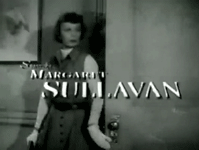












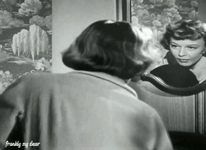
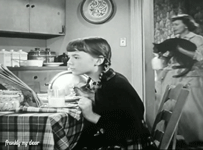

































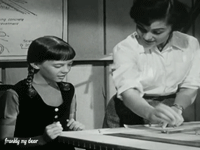







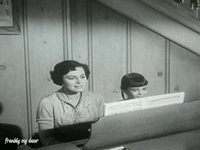




















.JPG)

















.jpg)







.jpg)





.png)




.jpg)






.jpg)













.jpg)


.jpg)










.jpg)



.jpg)

.gif)

.jpg)



.jpg)

















.jpg)
.jpg)

.jpg)
.jpeg)

Thanks for your comment, Paco Granados
ReplyDelete